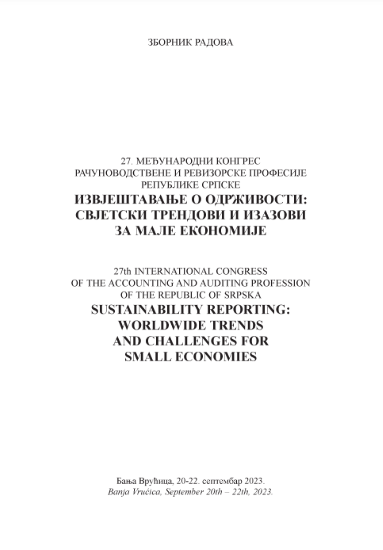РАЧУНОВОДСТВЕНИ И РЕВИЗИЈСКИ ИЗАЗОВИ ПРИ ИЗБОРУ КЉУЧНИХ ФИНАНЦИЈСКИХ ПОКАЗАТЕЉА У ПРОЦЕСУ ИЗВЈЕШТАВАЊА О ОДРЖИВОСТИ ПОСЛОВАЊА ПОДУЗЕЋА
ACCOUNTING AND AUDIT CHAUUENGES IN THE SELECTION OF KEY FINANCIAL INDICATORS IN THE PROCESS OF REPORTING ON THE SUSTAINABILITY OF A COMPANY’S OPERATIONS
Author(s): Vinko Belak
Subject(s): Business Economy / Management, Financial Markets, Accounting - Business Administration
Published by: Savez računovođa i revizora Republike Srpske
Keywords: going concern; significant doubt; financial indicators; management responsibility; auditor responsibility;
Summary/Abstract: IAS 1 - Presentation of financial statements in point 25 obliges the management to make an assessment of its entity’s ability to continue with time-limited operations when compiling the financial statements. Therefore, in its report, the management should publish appropriate evidence of the sustainable business of the company. Accordingly, the entity is obliged to prepare financial statements under the principle of going concern. However, when management is aware, in its judgment, of significant uncertainties related to events or conditions that may cast significant doubt on the entity’s ability to continue as a going concern, the entity must disclose those uncertainties. According to the provisions ofMRevS570, the external auditor also has the obligation to point out the existence of significant uncertainty that may cause significant doubt about the Company’s ability to continue with time-limited operations. Disclosure of significant doubt about the entity’s ability to continue as a going concern can be very inconvenient for management because it deters business partners, investors and creditors from cooperating with that company. For this reason, the external auditor’s statement that there is significant doubt about the entity’s ability to continue as a going concern often causes disagreements and conflicts between the management and the external auditor in cases where the evidence presented is emphatically uncertain or can be disputed. Since it is an assessment of events in the future, the evidence is never completely certain. This is precisely why the choice of indicators in the sustainability reporting process represents a real challenge for management and auditors. Although the indicators can be financial and non-financial, in this work the research is focused on the choice of financial indicators. When evaluating the value of key finical indicators in the process of reporting on the sustainability of the company’s operations, experiential analysis based on the ,,rule of thumb “, pro-forma analysis and discrimination analysis of empirical data from financial statements 'was used. Depending on these analyses, at the end, a set of indicators and models is proposed that can be used in the selection of indicators in the sustainability reporting process that can be useful for management and auditors.
- Page Range: 335-350
- Page Count: 16
- Publication Year: 2023
- Language: Serbian
- Content File-PDF

